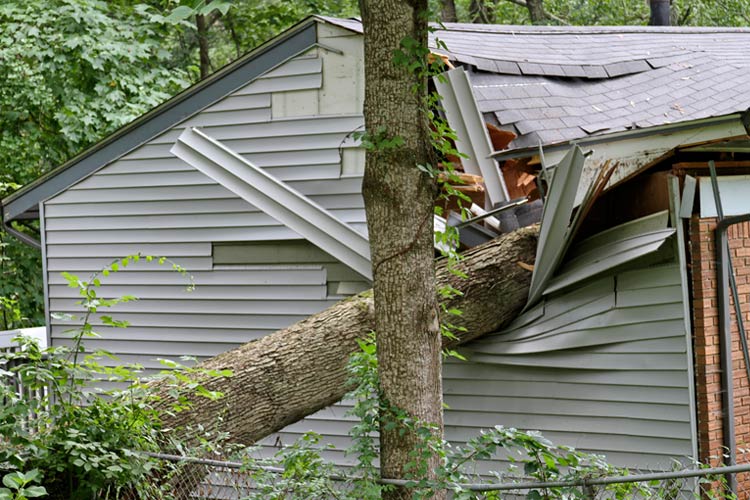
Not all homeowners insurance claims are created equal. You never know when the culprit of major property damage will be a tree from your neighbor’s yard. But what if a neighbor’s tree really does fall onto your home? Who’s responsible for this mess, anyway?
Fortunately, an independent insurance agent can not only answer this question for you, but also get you set up with the right homeowners insurance. Even better, they’ll get you covered long before you ever have to file a claim, no matter how unexpected. First, here’s a closer look at who’d be responsible in this situation.
Whose Tree Is It, Really?
Before answering the question of who’s responsible if a tree falls onto your home, it’s important to first determine who the tree actually belongs to. Whoever owns the land that holds the trunk of the tree, owns the tree itself. The branches, leaves, etc. can extend into a neighbor’s yard or over their home, but that doesn’t make it theirs.
Who’s Responsible for Fallen Tree Damage?
According to insurance expert Paul Martin, unless it can be proven that they were negligent, your neighbor is unlikely to be found to be responsible for the tree falling onto your property. If your neighbor ignored a dead and rotting tree on their property for years that was an obvious hazard, they could be held responsible for its collapse.
However, many fallen trees are considered “acts of nature” or “acts of God” by insurance companies, such as if a tree was struck by lightning. But there are other scenarios still that could’ve caused the tree to fall through no fault of your neighbor, such as if it was hit by a drunk driver. It really depends on the situation.
Will Your Homeowners Insurance Cover Costs if You Are Liable?
Let’s flip the situation and assume it was your tree that fell onto your neighbor’s home. If you were found to be liable for the damage, they could sue you. Fortunately, the liability coverage built into your homeowners insurance would kick in to protect you.
Homeowners insurance provides liability coverage for your legal defense in case you get sued by a third party, like your neighbor. Coverage pays for expenses like attorney, court, and settlement fees. Likewise, if you chose to sue your neighbor if their tree fell onto your home, their homeowners policy would cover them.
Is Damaged Landscaping Covered, Too?
It could be. It’s important to review your homeowners insurance policy with your independent insurance agent to find out for sure. But there are many scenarios in which landscaping on your property should be covered from damage, such as if a third party acted negligently in your yard. Damage from natural disasters is often covered, too.
How Costly Is a Fallen Tree Claim?
How much your fallen tree claim costs will depend on a number of factors, such as the extent of the damage done to your property. Many insurance companies include coverage between $500 to $1,000 for removing a fallen tree. But the removal of a fallen tree can cost up to $2,000 or more before even calculating property damage.
If the tree falls on the structure of your home, the coverage for the damage should extent up to your policy’s limit in the dwelling category. If the tree fell onto personal belongings right outside the home, your coverage should kick in up to your contents coverage’s limit. An independent insurance agent can help clarify these limits in your policy for you.
How Can You Proactively Prevent Falling Trees?
It’s helpful to prevent fallen tree problems before they start. If you put in the time and effort to take care of the trees on your property, you could end up saving yourself from a major headache (and potential lawsuit) down the road.
More than 100 people are killed by fallen trees each year.
Take these action steps today to prevent future fallen trees.
- Inspect your tree’s health: Look at the tree’s trunk, branches, leaves, and roots for signs of decay often. Sick trees often start showing dead branches from the top down. If there’s any visible damage to the tree’s roots, this could also lead to a fall in the future.
- Check for fungi and pests: An infestation of insects or fungi on your tree could lead to disease or death of the tree. If you see fungi or pests on your tree, it’s important to take care of that problem early to save the plant, and possibly your neighbor’s home.
- Remove any risks: Sometimes sick trees can’t be recovered. If you’ve got a critically ill tree or one that’s already dead or rotting on your property, it’s important to get it removed before it leads to a much bigger disaster, even a fatality.
Keeping an eye on any trees on your property can really benefit you and your neighbors alike. Likewise, if you spot a tree on your neighbor’s property that could be problematic, don’t be afraid to speak up. Taking care of a problem up front can save you both from a lot of unnecessary trouble.
Here’s How an Independent Insurance Agent Would Help
Independent insurance agents are fully equipped to protect homeowners against commonly faced liabilities. Independent insurance agents shop multiple carriers to find providers who specialize in homeowners insurance.
They can deliver quotes from a number of different sources and help you walk through them all to find the best blend of coverage and cost.
Author | Chris Lacagnina
Article Reviewed by | Jeff Green
https://www.iii.org/article/if-a-tree-falls-on-your-house-are-you-covered
https://www.reifflawfirm.com/100-people-killed-trees-every-year-united-states/
© 2024, Consumer Agent Portal, LLC. All rights reserved.